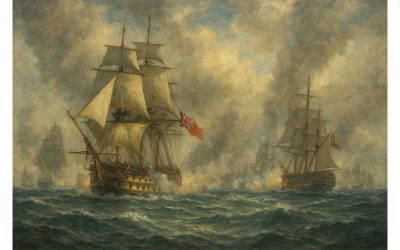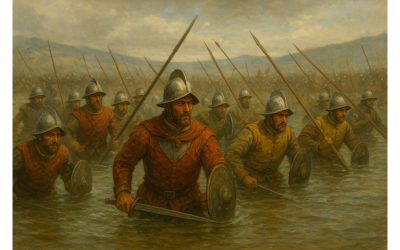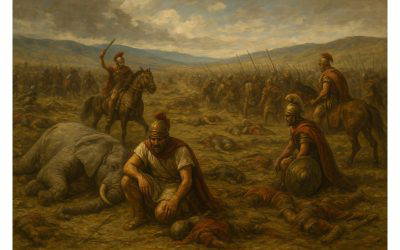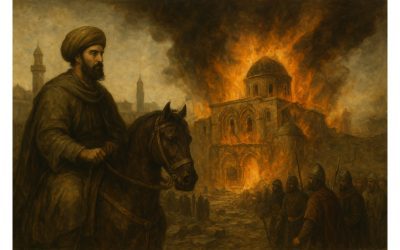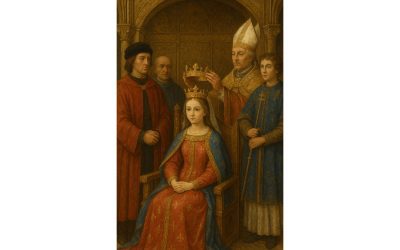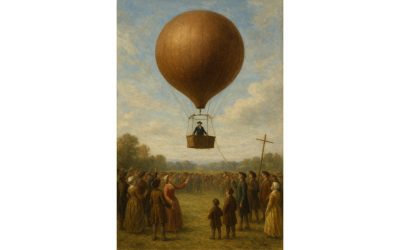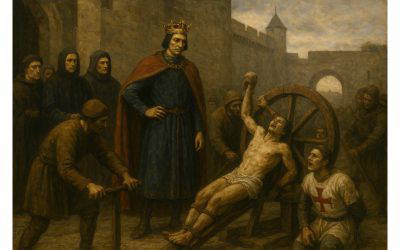Trafalgar
The Battle of Trafalgar was fought on the 21st of October, 1805. So when I crack open a bottle of something alcoholic this evening I shall say the toast, ‘to the immortal memory of Lord Nelson and those who fell with him.’ I have written about the use of intelligence...
Relief of Goes
The 20th of October was my father’s birthday. I’ve posted about my father a few times, so for today’s blog I shall write about the Relief of Goes, an amazing feat during the Eighty Years’ War, which was my ancestor Sir Anthony Standen’s war. Context of the Conflict...
Hannibal
It’s hard to choose the subject of today’s blog. As a writer I am tempted by the publication of Jayne Eyre in 1847. Russia is hardly ever out of the news, and today marks the Treaty of Drottningholm between Sweden and Russia in 1791 and Napoleon’s retreat from Moscow...
The Church of the Holy Sepulchre
On the 18th of October, 1009, the Church of the Holy Sepulchre in Jerusalem was completely destroyed by Fatimid caliph Al Hakim bi Amr Allah, who hacked the church’s foundations down to the bedrock. The Church of the Holy Sepulchre, located in the Christian Quarter...
Oldest University
The event which has caught my eye for the 17th of October is the founding of the University of Greifswald in 1456, according to Wikipedia, the second oldest university in Northern Europe. I confess that at first reading I missed the “northern” and thought no, Oxford...
Hedwig
OK, hands up, I’m not writing about Harry Potter’s owl. Hedwig (in German), Hedvig (in Hungarian), or Jadwiga (in Polish) was crowned king of Poland, even though she was a woman, on the 16th of October, 1384. Born around 1373 or 1374, she was the youngest daughter of...
Balloons
I have posted about my interest in aviation, and I proposed to Claire in a hot air balloon, so I am drawn to balloons for today’s post. On the 15th of October, 1783, the Montgolfier brothers’ hot air balloon made the first tethered ascent with humans aboard, piloted...
Chuck Yeager
I decided to write about Chuck Yeager today, because on the 14th of October, 1947, he broke the sound barrier in level flight over Muroc Army Airfield in California, flying a Bell XS-1. I might have written about Mary Queen of Scots, because her trial began on this...
King Philip the Fair
On the 13th of October, 1307, hundreds of Knights Templar were arrested at dawn by King Philip the Fair. King Philip IV of France, known as Philip the Fair (Philippe le Bel), was born in 1268 and reigned from 1285 until his death in 1314. His moniker, 'the Fair,'...
Trafalgar
The Battle of Trafalgar was fought on the 21st of October, 1805. So when I crack open a bottle of something alcoholic this evening I shall say the toast, ‘to the immortal memory of Lord Nelson and those who fell with him.’ I have written about the use of intelligence...
Relief of Goes
The 20th of October was my father’s birthday. I’ve posted about my father a few times, so for today’s blog I shall write about the Relief of Goes, an amazing feat during the Eighty Years’ War, which was my ancestor Sir Anthony Standen’s war. Context of the Conflict...
Hannibal
It’s hard to choose the subject of today’s blog. As a writer I am tempted by the publication of Jayne Eyre in 1847. Russia is hardly ever out of the news, and today marks the Treaty of Drottningholm between Sweden and Russia in 1791 and Napoleon’s retreat from Moscow...
The Church of the Holy Sepulchre
On the 18th of October, 1009, the Church of the Holy Sepulchre in Jerusalem was completely destroyed by Fatimid caliph Al Hakim bi Amr Allah, who hacked the church’s foundations down to the bedrock. The Church of the Holy Sepulchre, located in the Christian Quarter...
Oldest University
The event which has caught my eye for the 17th of October is the founding of the University of Greifswald in 1456, according to Wikipedia, the second oldest university in Northern Europe. I confess that at first reading I missed the “northern” and thought no, Oxford...
Hedwig
OK, hands up, I’m not writing about Harry Potter’s owl. Hedwig (in German), Hedvig (in Hungarian), or Jadwiga (in Polish) was crowned king of Poland, even though she was a woman, on the 16th of October, 1384. Born around 1373 or 1374, she was the youngest daughter of...
Balloons
I have posted about my interest in aviation, and I proposed to Claire in a hot air balloon, so I am drawn to balloons for today’s post. On the 15th of October, 1783, the Montgolfier brothers’ hot air balloon made the first tethered ascent with humans aboard, piloted...
Chuck Yeager
I decided to write about Chuck Yeager today, because on the 14th of October, 1947, he broke the sound barrier in level flight over Muroc Army Airfield in California, flying a Bell XS-1. I might have written about Mary Queen of Scots, because her trial began on this...
King Philip the Fair
On the 13th of October, 1307, hundreds of Knights Templar were arrested at dawn by King Philip the Fair. King Philip IV of France, known as Philip the Fair (Philippe le Bel), was born in 1268 and reigned from 1285 until his death in 1314. His moniker, 'the Fair,'...

